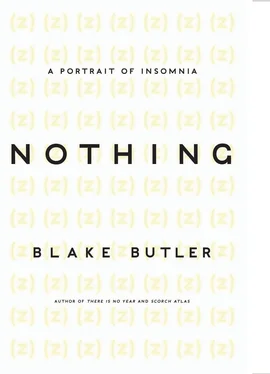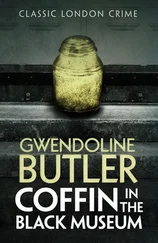From the pharmacotherapy manual I borrowed from a friend’s mom to study sleep medications, there are further sections on stages of cognitive decline, which in their clinically emotional language read like the last year or two of Dad’s waking life, often not too far-flung from an extreme state of the sleepless, despite his now sleeping more than ever, day to day:
Stage 4 (Late confusion) Patient can no longer manage finances or homemaking activities. Difficulty remembering recent events. Begins to withdraw from difficult tasks and to give up hobbies. May deny memory problems.
My mother at the kitchen table certain afternoons with the reams of foreign paper spread around her, wearing reading glasses over the checkbook, the way I remember Dad had always done. The way the eyes change behind the glasses, larger, dimensioned outward toward nowhere.
Stage 5 (Early dementia) Patient can no longer survive without assistance. Frequently disoriented with regard to time (date, year, season). Difficulty selecting clothing. Recall for events is severely impaired; may forget some details of past life (e.g., school attended or occupation). Functioning may fluctuate from day to day. Patient generally denies problem. May be suspicious or tearful. Loses ability to drive safely.
The cereal bowl covered in cellophane inside the crisper drawer this time. The closet. The blue bowl of cranberry juice left on the counter. The way my father will return to the same common roles over and over, eating more than ever, sleeping more than ever, showers at 3 PM, glassed in inside how he cannot remember exactly what he’s already done.
And just beneath this, what is to come:
Stage 6 (Middle dementia) Patients need assistance with activities of daily living (e.g., bathing, dressing and toileting). Patients experience difficulty interpreting their surroundings; may forget names of family and caregivers; forget most details of past life; have difficulty counting backward from 10. Agitation, paranoia, and delusion are common.
And then:
Stage 7 (Late dementia) Patient loses ability to speak (may only grunt or scream), walk, and feed self. Incontinent of urine and feces. Consciousness reduced to stupor or coma.
The average period of onset herein being eight years. His mind inside him ending before the body, dragging the body behind it, in revolt. How of all the doctors my father’s seen in the past months, their most common observation is what great shape his flesh is in — how were it not for his gradually destructing synapses, he would seem so young for his age. If it were not for those holes.
That at first I’d begun to type these stages out for how their shift bumped against the strange glass of prolonged waking, and in the recitation finding my fingers stuck hard to the keys. Knowing only slightly, sidelong, how perhaps that shifting seems, as insomnia does, like being locked out of a large, comfortable house and into a mirrored room where air is heavier, under oil. Standing at that old familiar window seeing people passing, with each revolution seeming less and less like anyone we know. The tunnels of terror-walking growing tighter, warmer, leaner to the face, approaching a shapeless, shaking destination that seems further off the nearer it becomes. As if I could parse that, here, in my soft body. As if any inch of his descending, glazing mind could here be gleaned. My hours spent seated low in front of this machinic glow box typing these words out instead of standing with him, standing in the light of his remembrance while it remains.
Here I am not asking, not saying, moving past, for how these hours, new to him, for me repeat. That how, in my father’s blanking and often disoriented, disturbed flesh, in his forgetting, confusing ways he’d walked inside of so long now every day — how underneath that, in the moment, in the sheer bulk of his frustration, the bulge of his tongue pressed in fury behind his bottom lip, same as mine in the same spot — how in the deliberate way he chews, in all his pacing, staring, seeing, I see him still right there — caught or clogged inside a self of other self, a fully breathing body mask — how underneath that, at its center, beyond the fluttered veils, and no matter how gone — he is there. And in him I still see him, however tattered, however pulled apart in his own form. The food he eats and eats, in his forgetting of what he’s already put inside him, building the body’s rooms. Obsessed with how the house is empty. The hours seated, still. The two pairs of jeans he folded over his arm in the mind he’d be leaving to live inside “the homeplace,” his parents’ house, that phantom body, still packed inside there with his instances of bodies of the living and the dead, though even when he sees them in the human air arrived to visit, he doesn’t recognize they’re there. It seems profane to mention the way for years my father said and said again he’d rather get turned off than be out of his control. How in his saying that, then, it seemed a joke almost, like some unmade day that would, could, never come.
The days continue coming anyway, regardless of how long off they are. Regardless of all these rooms hidden online or on film or in air, how many hours we could spit into machines. My father in the afternoons still watching NASCAR, younger men behind the wheels of cars he can no longer drive. Earlier this day it crushed me in my body to watch him stand before the TV with his coat on and keys still in hand as the race emcee shouted “Gentlemen, start your engines!” and my father’s arms did not move. The race being the Daytona 500, where my father would go each year with his brothers to watch the cars do circles live, and with them together eat and drink. The circling. Days coming. Night.
“Where is everybody?” my father asks most times I see him, in the strings of days, coming from rooms alone into rooms where there I am — as if in days before the rooms would teem with people who have since then become disappeared. Seeing the thinning returning to my sleeping recently now after long periods of better evenings seems, since my taking notice of it, to have reinforced its gait, as the last few days now in particular I’ve been up still when the sun rose, still thinking the same things. Seems like it’d been forever since that flopping grouse wound and unwound me, flopping unmeasured patterns on the bed — and yet familiar, like a room inside the house I’d been in a billion times until I’d forgotten it was right there on the air. The copying cycle returning cleanly as if it had never been gone. The familiar, but never less disruptive seize, that same blank awaking its unawaking in my brain.
With my head folded in the lip groove of the pillow, the contents of the skull seem heavy, warm. As if a fat field buzzing there between the skin, a bug light waiting to give zap. I do not want to think this thought, and so it thinks me, harder. Not that I could tell you better now, because of this, anything about it. Close up, the string seems even shorter. The knot of thoughts that eat the hours mostly circling that small series of ideas, which in removal seem a flat blur. Eight hours passed flat on the back, feeling like twenty hours minute to minute, but like two or three in retrograde. The longest, fastest night. The residual refrain: Please stop thinking. Please, this is the end now. I will silence myself and lie still. The clock will no longer continue rolling. When I stand up, I will feel real. Among the day here in the house with the forgetting man the blank spots stretching larger for each time I instigate them, and in the making. All the hands at all the buttons. All the brains. I write the paragraph and then delete it. I open and close files, staring at words. I can feel something stirring in me, in there, wanting out, and yet the doors at best revolve — pumping in and at themselves in want of wanting. Eating. Refreshing faster, faster, for more new. All those finite people in any image, cells in some black fabric, spreading, under night, dismantling the self in other aura, awake but not awake.
Читать дальше












